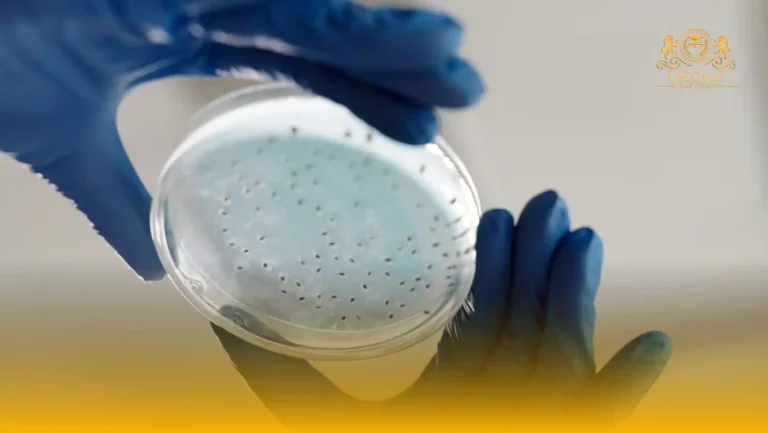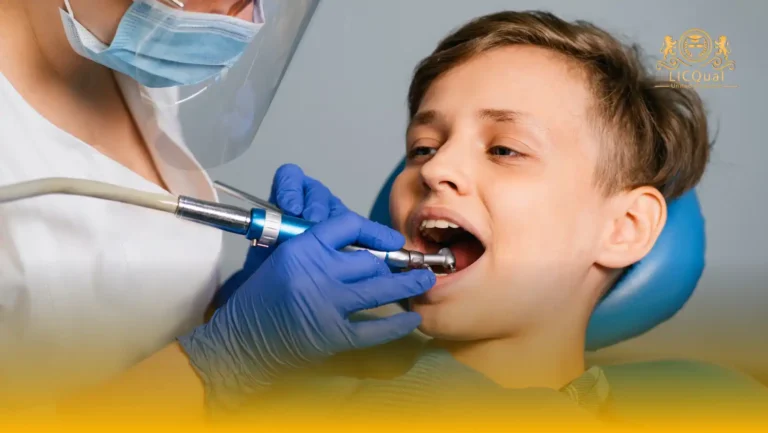The LICQual Level 7 Postgraduate Diploma in Pediatric Medicine (PgD Pediatrics) is a highly specialised qualification designed for experienced healthcare professionals who wish to advance their expertise in the field of paediatrics. This programme is not intended for fresh entrants but for qualified practitioners seeking to enhance their career prospects, broaden their clinical knowledge, and strengthen their Continuing Professional Development (CPD).
The course provides learners with an advanced understanding of paediatric healthcare, focusing on evidence-based clinical practices, child development, common and complex paediatric conditions, and modern approaches to treatment and management. With an emphasis on applied learning, it prepares professionals to take on leadership roles within healthcare settings, while ensuring the highest standards of care for infants, children, and adolescents.
Centres delivering this qualification must meet rigorous standards, ensuring that learners receive the best possible training experience. This includes employing competent and highly qualified staff, alongside providing access to appropriate clinical resources, up-to-date learning materials, and supportive learning environments. Such requirements guarantee that the programme maintains academic excellence and produces confident, skilled professionals who can make a meaningful impact in paediatric medicine.
By enrolling in this postgraduate diploma, learners gain not only advanced knowledge but also the professional recognition required to progress in their careers. The qualification is a strong foundation for those aiming to contribute to the advancement of paediatric healthcare through clinical practice, leadership, or further research opportunities.
Course Overview
Qualification Title
LICQual Level 7 Postgraduate Diploma in Pediatric Medicine (PgD Pediatrics)
Total Units
6
Total Credits
120
GLH
600
Qualification #
LICQ2200969
Qualification Specification
To enroll in the LICQual Level 7 Postgraduate Diploma in Pediatric Medicine (PgD Pediatrics), applicants must meet the following criteria:
|
Qualification# |
Unit Title |
Credits |
GLH |
|---|---|---|---|
|
LICQ2200969-1 |
Advanced Principles of Paediatric Medicine |
20 |
100 |
|
LICQ2200969-2 |
Diagnosis and Management of Common Paediatric Conditions |
20 |
100 |
|
LICQ2200969-3 |
Complex and Critical Care in Paediatrics |
20 |
100 |
|
LICQ2200969-4 |
Paediatric Pharmacology and Therapeutics |
20 |
100 |
|
LICQ2200969-5 |
Research Methods in Paediatric Medicine |
20 |
100 |
|
LICQ2200969-6 |
Leadership, Ethics, and Professional Practice in Paediatrics |
20 |
100 |
By the end of this course, learners will be able to:
Unit 1: Advanced Principles of Paediatric Medicine
- Critically evaluate theories of child growth, development, and physiology
- Apply advanced knowledge of paediatric anatomy and physiology to clinical practice
- Assess the impact of genetic, environmental, and social factors on child health outcomes
- Demonstrate evidence-based approaches to paediatric medical care
Unit 2: Diagnosis and Management of Common Paediatric Conditions
- Identify and analyse signs, symptoms, and diagnostic pathways for common paediatric illnesses
- Develop evidence-based management plans for acute and chronic conditions
- Evaluate the effectiveness of current treatment protocols in paediatric practice
- Apply safe, effective, and ethical clinical decision-making in patient care
Unit 3: Complex and Critical Care in Paediatrics
- Demonstrate advanced knowledge of neonatal and paediatric intensive care
- Apply critical care principles in managing life-threatening paediatric emergencies
- Assess multidisciplinary approaches to complex paediatric cases
- Critically evaluate ethical and clinical challenges in paediatric critical care
Unit 4: Paediatric Pharmacology and Therapeutics
- Analyse pharmacokinetics and pharmacodynamics in children at different developmental stages
- Prescribe and manage medicines safely and effectively in paediatric patients
- Critically evaluate new and emerging therapies in paediatric pharmacology
- Apply ethical and professional standards to paediatric prescribing practices
Unit 5: Research Methods in Paediatric Medicine
- Critically analyse research methodologies relevant to paediatric medicine
- Design and conduct research projects using ethical and evidence-based approaches
- Apply statistical and analytical tools to evaluate clinical data
- Interpret and present research findings to support advancements in paediatric practice
Unit 6: Leadership, Ethics, and Professional Practice in Paediatrics
- Apply leadership principles to clinical and organisational paediatric settings
- Critically evaluate ethical frameworks in paediatric decision-making
- Demonstrate advanced communication and teamwork skills in multidisciplinary healthcare
- Reflect on professional practice to support continuous improvement and CPD
The LICQual Level 7 Postgraduate Diploma in Pediatric Medicine (PgD Pediatrics) is designed for healthcare professionals, beginners entering the medical field, and career changers who want to specialize in child healthcare and pediatric medicine. This internationally recognized qualification provides CPD accreditation, advanced knowledge, and practical skills in pediatric care, making it ideal for doctors, nurses, medical graduates, and professionals transitioning into healthcare. Whether you are seeking career progression, global recognition, or a new pathway into pediatric medicine, this program offers the flexibility and depth to meet your goals.
Healthcare Professionals Advancing Their Careers
- Doctors aiming to specialize in pediatric medicine and child healthcare
- Nurses seeking leadership roles in pediatric wards and community health programs
- Allied health professionals expanding into pediatric clinical practice
- Medical practitioners interested in pediatric emergency care and pharmacology
- Professionals looking for CPD accredited pediatric medicine qualifications
Beginners Entering Pediatric Medicine
- Fresh graduates exploring postgraduate pathways in healthcare and pediatrics
- Students seeking a recognized Level 7 qualification in pediatric medicine
- Individuals interested in evidence-based pediatric practice and child development
- Learners wanting to build foundational knowledge in pediatric healthcare systems
- Beginners looking for flexible online study options with international recognition
Career Changers Transitioning into Healthcare
- Professionals from non-medical backgrounds seeking new opportunities in healthcare
- Managers moving into healthcare leadership and pediatric policy roles
- Individuals passionate about child health and patient safety
- Career changers looking for internationally accredited pediatric qualifications
- Those seeking practical skills for immediate application in healthcare
Pediatric Specialists and Child Health Experts
- Pediatricians seeking advanced training in complex child health conditions
- Healthcare workers involved in neonatal and pediatric emergency care
- Specialists interested in pediatric pharmacology and clinical practice
- Practitioners preparing for leadership roles in pediatric healthcare systems
- Professionals aiming to improve outcomes in child development and care
International Students and Global Learners
- Learners seeking a UK-accredited postgraduate diploma in pediatric medicine
- Students aiming for global recognition and career mobility in healthcare
- International healthcare professionals expanding their pediatric qualifications
- Individuals preparing for roles in hospitals, NGOs, and global health systems
- Students looking for flexible online study options across borders
Academics and Researchers in Pediatric Medicine
- Researchers focusing on child development and pediatric healthcare studies
- Academics seeking advanced postgraduate qualifications in pediatrics
- Professionals aiming to publish in pediatric medicine and healthcare journals
- Educators developing curriculum in pediatric healthcare and policy studies
- Scholars interested in evidence-based pediatric interventions
Professionals Seeking CPD Accreditation
- Healthcare workers needing CPD accredited pediatric medicine qualifications
- Practitioners aiming to meet international professional standards
- Learners wanting recognized certification for career progression
- Professionals seeking structured postgraduate training in pediatrics
- Individuals preparing for advanced leadership roles in child healthcare
Centres wishing to deliver the LICQual Level 7 Postgraduate Diploma in Paediatric Medicine (PgD Paediatrics) must meet strict quality standards to ensure learners receive high-quality training and professional development. The following requirements apply:
- Qualified Teaching Staff: Centres must employ competent and highly qualified trainers with relevant academic credentials and professional experience in paediatric medicine.
- Access to Clinical Resources: Training centres must provide learners with access to up-to-date clinical resources, research materials, and digital learning platforms to support advanced study.
- Appropriate Learning Facilities: Centres should ensure that classrooms, simulation environments, and online platforms are well-equipped to deliver both theoretical and practical learning.
- Quality Assurance Systems: A robust internal quality assurance framework must be in place to maintain academic integrity and ensure compliance with international standards.
- Learner Support Services: Centres should provide academic guidance, pastoral support, and career development services to enhance learner success.
- Technological Infrastructure: Reliable internet access, digital tools, and secure platforms must be available for blended and online learning delivery.
- Commitment to CPD: Centres must actively support Continuing Professional Development (CPD) for both learners and staff to ensure knowledge remains current and relevant.
By meeting these requirements, centres can deliver a world-class qualification that empowers healthcare professionals to advance their expertise and contribute to excellence in paediatric medicine.
Assessment and Verification
All units within this qualification are subject to internal assessment by the approved centre and external verification by LICQual. The qualification follows a criterion-referenced assessment approach, ensuring that learners meet all specified learning outcomes.
To achieve a ‘Pass’ in any unit, learners must provide valid, sufficient, and authentic evidence demonstrating their attainment of all learning outcomes and compliance with the prescribed assessment criteria. The Assessor is responsible for evaluating the evidence and determining whether the learner has successfully met the required standards.
Assessors must maintain a clear and comprehensive audit trail, documenting the basis for their assessment decisions to ensure transparency, consistency, and compliance with quality assurance requirements.







